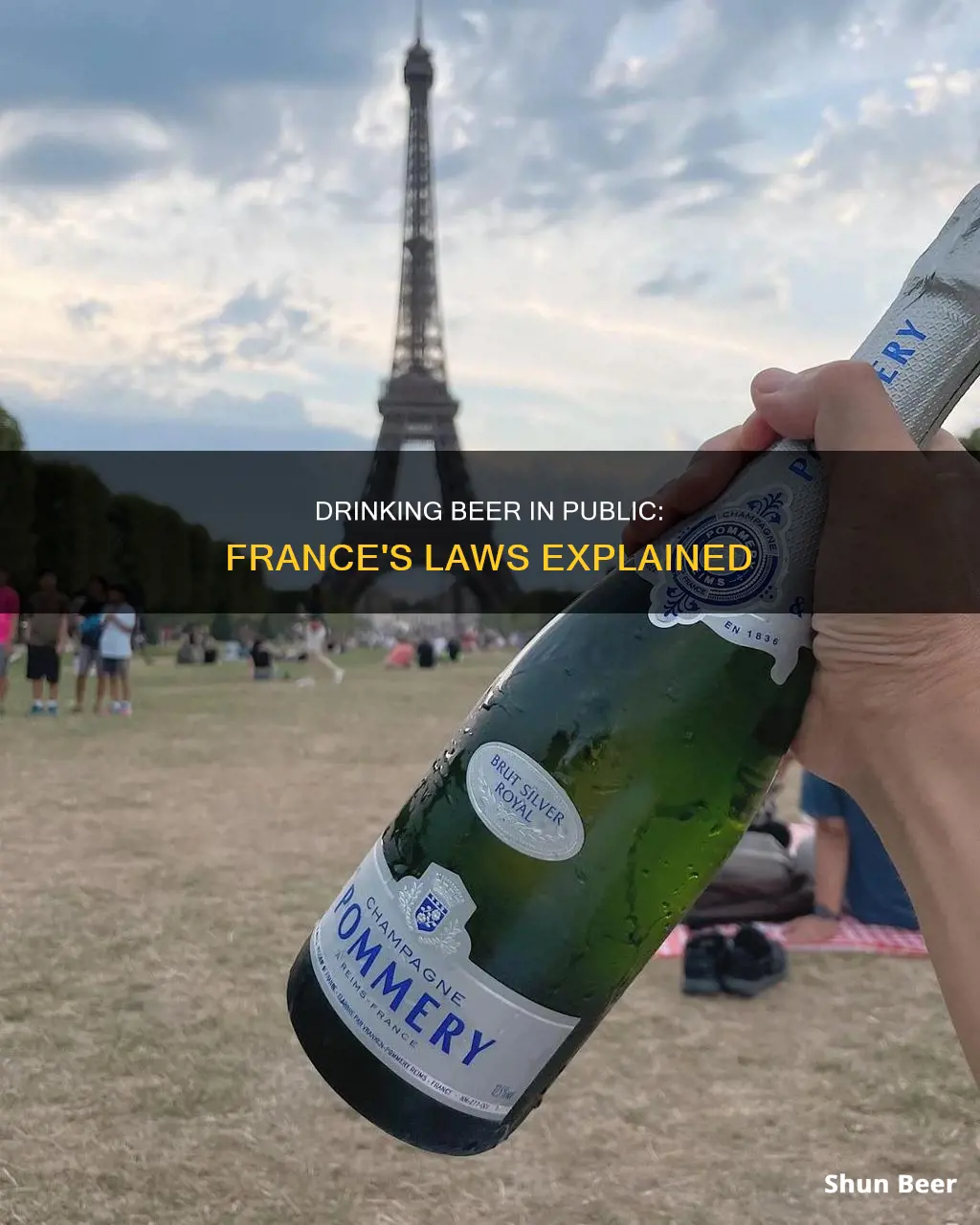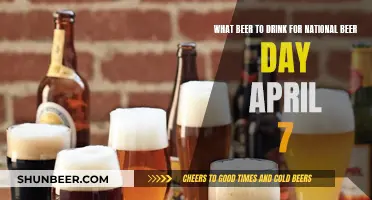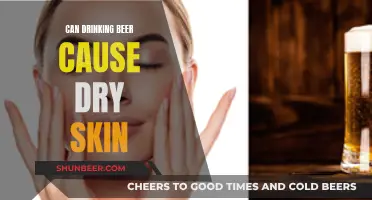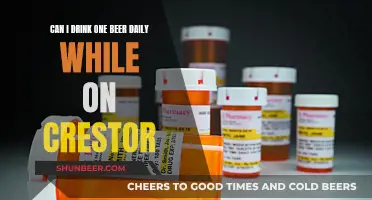
Drinking in public is relatively common in France, and it is not prohibited at the national level. However, local rules vary across the country, and there are certain places in France where public drinking is more regulated. For instance, drinking in public spaces like parks, streets, or river banks is generally allowed, but there may be specific areas or time restrictions in certain localities. Paris, for example, has several neighbourhoods where drinking in public between 4 pm and 7 am is not permitted. Additionally, drinking laws apply to minors, with the legal drinking age set at 18 years, and public drunkenness is considered an offence.
| Characteristics | Values |
|---|---|
| Legal drinking age | 18 |
| Drinking in public | Allowed, but some local rules and restrictions apply |
| Drinking on public transport | Not allowed |
| Drinking in parks | Allowed, but some parks may have their own rules |
| Drinking near schools | Banned by most local authorities |
| Drinking in workplaces | Illegal, except for wine, beer and cider |
| Drinking at sports grounds | Banned, but some exceptions apply |
| Drinking and driving | Illegal with a blood alcohol level of 0.5 grams per litre of blood or higher |
What You'll Learn
- Drinking in public is not illegal in France, but local laws may vary
- Paris has many restrictions on public drinking, including parks and the Seine
- Public drunkenness is a criminal offence in France
- Alcohol is banned in all sports grounds, except for certain sports
- Alcohol laws are enforced more strictly for minors

Drinking in public is not illegal in France, but local laws may vary
In parks, drinking alcohol is typically allowed, and it is common to see people enjoying a bottle of wine or a few beers with their picnic. However, there are exceptions, and some parks in Paris, such as the Champ de Mars and the Jardin du Luxembourg, have enforced bans on alcohol. It is important to look out for signs indicating any restrictions.
When it comes to public spaces that are not parks, such as streets or riverbanks, drinking is usually permitted unless there is a specific police order in place. During the summer months in Paris, it is a popular choice to head to the banks of the Seine or the Canal Saint-Martin with friends and a bottle of wine, and this is perfectly legal.
While drinking in public may be allowed in many places in France, it is important to remember that being drunk in public is a criminal offence and can result in a fine. Additionally, drinking and selling alcohol near schools are typically banned by local authorities. It is also prohibited to drink alcohol while using public transportation, such as the metro or buses.
Beer and Glimepiride: Is It Safe to Drink?
You may want to see also

Paris has many restrictions on public drinking, including parks and the Seine
Paris has many restrictions on public drinking, which have been gradually introduced since 2018. The latest directive, published in April 2023, includes neighbourhood-by-neighbourhood zones where drinking in public is banned between 4 pm and 7 am. This includes large parts of central Paris, such as the Champs de Mars, the Marais, Les Halles, the Latin Quarter, the Champs Elysées, and the Belleville district.
The directive also bans drinking along the quays of the Canal St-Martin, Bassin de la Villette, and the Seine River, including the Ile St-Louis and Ile de la Cité, from May to October between 4 pm and 7 am. Drinking in Parisian parks, including municipal parks and those run by other authorities, is also prohibited. This means that popular spots such as the Jardin des Plantes, Jardin du Luxembourg, and the Palais-Royal are off-limits for drinking.
While drinking in public is relatively common in France, Paris has introduced stricter rules in recent years. These laws are often aimed at tackling public drunkenness and anti-social behaviour. The police may give a warning before confiscating alcohol and issuing a fine, which can be up to €7500. It is also prohibited to have glass bottles in parks and along the Seine and Canal St Martin, due to the nuisance of broken glass.
So, while public drinking is not prohibited in all of France, Paris has many restrictions in place, and it is important to be aware of these rules and any signs indicating where drinking is not allowed.
Misoprostol and Beer: A Safe Mix?
You may want to see also

Public drunkenness is a criminal offence in France
While drinking in public is relatively common in France, public drunkenness is a criminal offence. This means that being drunk in a public space can result in a fine of up to €150.
It's important to note that the laws around drinking in public spaces vary across France. For example, in Paris, there are many restrictions on where alcohol can be consumed. These include bans on drinking alcohol in public parks and squares, as well as along the Seine River during the summer months. There are also certain neighbourhoods where drinking in public is banned between 4 pm and 7 am.
In other parts of France, such as Strasbourg, there are bans on public drinking during certain hours. So, it's always a good idea to check the local laws and regulations before consuming alcohol in public.
Additionally, it's worth noting that the legal drinking age in France is 18, and establishments serving alcohol are required to verify proof of age. It is also illegal to sell or offer alcoholic drinks to minors under 18 years old.
While drinking in public may be common in France, it's important to be mindful of the laws and regulations to avoid any fines or legal consequences.
Drinking Beer Outside: Legal or Not?
You may want to see also

Alcohol is banned in all sports grounds, except for certain sports
In France, the sale and consumption of alcohol in public spaces are not prohibited. However, there are certain exceptions to this rule. For instance, drinking in public places like the Champ de Mars in front of the Eiffel Tower, the Jardin Nelson Mandela at Les Halles, and the Luxembourg Gardens is forbidden. Additionally, drinking on public transport, such as the metro or buses, is not allowed.
While alcohol is typically banned in sports grounds, there are exceptions for certain sports. For example, rugby games, including internationals, always serve alcohol, and the sale of alcohol was permitted for the first time at the French Open at Roland Garros in 2024. Basketball and handball fans can also usually purchase alcohol at games.
The approach to alcohol sales differs depending on the sport and the level of competition. Lower-league football matches, for instance, may be more flexible due to the reduced likelihood of inspections or local authorisation for alcohol sales. On the other hand, football clubs are tightly regulated during professional domestic and international matches, and alcohol is typically not served.
The laws regarding alcohol consumption in France continue to evolve, with new restrictions being added by the City of Paris. While public drinking is generally accepted, it is important to remain discreet and abide by local regulations to avoid any fines or confiscation of alcohol by the police.
Beer and Flu Medication: A Safe Mix?
You may want to see also

Alcohol laws are enforced more strictly for minors
Alcohol laws in France are enforced more strictly for minors. The legal drinking age in France is 18 years old, and this age limit is strictly enforced. It is prohibited to sell or offer alcoholic drinks to minors under 18 years old in drinks outlets, shops, and public places. This includes parks and along the Seine. The French government's official website states that "Minors cannot buy or consume alcohol in public places."
The drinking laws in France have evolved over time, and there are now stricter regulations in place to protect minors. Until 2009, the drinking age in France was 16 years old, and it was common for French teenagers to drink wine or beer in the streets or cafes. However, after a staggering increase in teen hospitalizations caused by binge drinking, the French government raised the drinking age to 18 and amended alcohol laws to reduce the hours when alcohol could be sold at service stations.
In addition to the legal drinking age, there are other restrictions in place to prevent minors from accessing alcohol. For example, bars and cafes are not meant to admit guests under the age of 16, and establishments serving alcohol are required to verify proof of age. It is also illegal to offer alcoholic drinks at reduced prices for a limited period, known as "happy hours," without also offering non-alcoholic drinks at reduced prices during the same period.
The French government has taken a strong stance against underage drinking, and these laws are enforced to protect the health and safety of minors. While public drinking is relatively common in France, it is important to be mindful of the age restrictions and other regulations in place to ensure responsible consumption.
Flu Shot and Beer: Is It Safe?
You may want to see also
Frequently asked questions
Public drinking is not prohibited in France, but there are some places where it is more regulated than others. Local laws may ban public drinking or the purchase of alcohol in certain areas or at certain times. Paris, for example, has many restrictions on where alcohol can be consumed in public.
While drinking in parks is rare to be banned, Paris has many restrictions on where alcohol can be consumed in public. Drinking in public parks, squares, and along the Seine River is banned. Drinking in public is also banned in certain neighbourhoods between 4 pm and 7 am.
Yes, the legal drinking age in France is 18. It is illegal to serve alcohol at staff social events in offices and workplaces, except for wine, beer, and cider. It is also illegal to drink and drive in France, with a blood alcohol limit of 0.5 grams per litre of blood.







